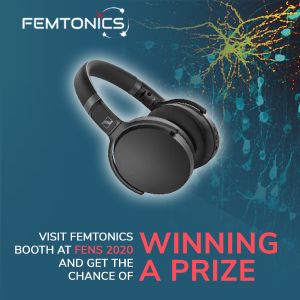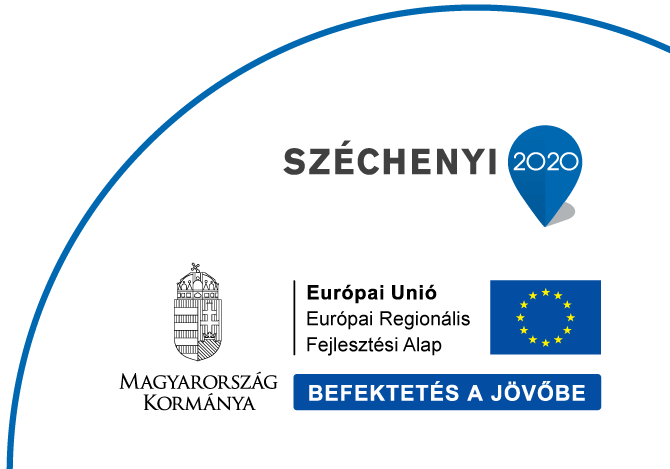On the fence about joining FENS 2020? For this year’s FENS meeting, organizers have put together an exciting program for all attendees: including the first Brain Debate, interactive discussions, opportunities for career development, workshops, FENS mini conferences and much more. The meeting will bring together the neuroscience community in a safe and virtual space, granting an easy access to the lectures and talks that spark your interest the most!
Meet Femtonics at FENS 2020
Besides the impressive series of events of the annual European neuroscience conference 2020 take a break and meet us online!
We are looking forward to greeting you at our virtual booth for a lively discussion about multiphoton microscopy. You will find us in the chat section between 10 AM and 5 PM (CEST): our application and product specialists will be available and will gladly answer all your questions! During this time we will be standby and will be happy to book appointments for live online demonstrations! We are eager to share our newest developments and technological advancements with you: we believe that they will further advance your ongoing or just proposed research projects.
The easiest way to find us is in the main lobby: click our logo to browse our freshest advancements at our virtual booth! We are looking forward to meet you online. Enjoy FENS Forum 2020!
Get the chance of winning a prize!

FENS forum program
Let us guide you through the long list of the appealing neuroscience programmes and highlight some of them that might be interesting for you. You can find the full list of events on the website of Federation of European Neuroscience Societies. The events and virtual contents will be accessible after the opening of the conference.
Parallel symposia
S16 – 50 years of barrel cortex: linking structure and function – Isabelle Ferezou, Christiaan de Kock, Randy Bruno, Jean-Sebastien Jouhanneau
12.07.2020, Sunday
13:00 – 14:30
S39 – The dentate gyrus: mechanisms of memory traces – Thomas Hainmueller, Antonio Fernandez-Ruiz, Mazen Kheirbek, Jill Leutgeb
13.07.2020, Monday
13:00 – 14:30
S42 – Astroglial networks in regulating sensory function and plasticity – Nathalie Rouach, Dmitri Rusakov, Kira Poskanzer, Gertrudis Perea
14.07.2020, Tuesday
13:00 – 14:30
Technical workshops – July 11, 2020, 09:00-11:30
W01 – Optogenetics: From new tools to applications – Edward Boyden, Viviana Gradinaru, Valentina Emiliani, Deniz Dalkara, Tobias Moser
W02 – Measuring the activity of individual neurons at a brain-wide scale – Sebastian Haesler, Nick Steinmetz, Pierre Yger, Na Ji, Anne Churchland
W03 – Glial interfaces: technology & methods to uncover the 4D glial role in brain function & dysfunction – Valentina Benfenati, Fabrizia Cesca, Ana Paula Pêgo, Maurizio de Pittà, Adi Doron, Mark Hutchinson
Mini conferences
MC02 – Molecular mechanisms of cognitive impairments and intellectual disability. Organised by the European Society for Neurochemistry (ESN)
11.07.2020, Saturday
08:00 – 11:30
Plenary lectures
PL09 – Hertie Foundation Closing Lecture – 15 July, 15:00-16:00
New approaches to studying intact brain structure and function. Karl Deisseroth (USA)
Special Lectures
SL11 – Mu-Ming Poo: Non-human primate models for neurobiology and biomedicine (EDAB – Lecture on Neuroethics) – 15 July, 12:00-12:45
e-Posters
Development and Stem Cells
12 July 14:30-16:00, 14 July 10:30-12:00
138 – The role of neuronal chloride levels in postnatal development of inhibitory synapses
Speaker(s): Carlijn Peerboom, Utrecht, Netherlands
Topic / Sub Topic: A.4.d Activity-dependent growth and remodelling
Neuronal and Glial Cell Properties
12 July 10:30-12:00, 13 July 14:30-16:00
206 – Ca2+ entry through voltage-gated Na+ channels mediates submillisecond axonal Ca2+ signaling
Speaker(s): Naomi A. Hanemaaijer, Amsterdam, Netherlands
Topic / Sub Topic: B.2.a Sodium channels
309 – Cell type- and myelin-dependent subcellular distribution of axonal mitochondria
Speaker(s): Koen Kole, Amsterdam, Netherlands
Topic / Sub Topic: B.7 Myelination
Synapses and Plasticity
13 July 10:30-12:00, 14 July 14:30-16:00
364 – An ER assembly line of AMPA-receptors controls excitatory neurotransmission and its plasticity
Speaker(s): Jochen Schwenk, Freiburg, Germany
Topic / Sub Topic: C.2.a Glutamate
Speaker(s): Lotte J. Herstel, Utrecht, Netherlands
Topic / Sub Topic: C.4.c Excitation/inhibition balance
Speaker(s): Gábor Juhász, Budapest, Hungary
Topic / Sub Topic: C.4.c Excitation/inhibition balance
Speaker(s): Liangying Zhu, BORDEAUX, France
Topic / Sub Topic: C.5.d Structural plasticity
Speaker(s): Andreas Ritzau-Jost, Leipzig, Germany
Topic / Sub Topic: C.5.f Other
Speaker(s): Dario Cupolillo, Bordeaux, France
Topic / Sub Topic: C.5.f Other
Speaker(s): Tuamoru Odii, London, United Kingdom
Topic / Sub Topic: C.6.a Astrocyte-neuron interactions
Visual, Auditory, Olfactory Systems
12 July 10:30-12:00, 14 July 14:30-16:00
632 – Opening the genetic toolbox in cats
Speaker(s): Gergely Meszaros, Budapest, Hungary
Topic / Sub Topic: D.4.b Subcortical pathways
Speaker(s): Gergely E. Szalay, Budapest, Hungary
Topic / Sub Topic: D.4.c Visual cortex: V1 and higher areas
680 – Allocentric vector coding of objects in motion
Speaker(s): Øyvind Arne A. Høydal, Trondheim, Norway
Topic / Sub Topic: D.4.d Visual cognition
Somatosensation, Pain and Motor Systems
12 July 14:30-16:00, 14 July 14:30-16:00
883 – Layer specific contributions of rat rostral and caudal forelimb areas to skilled movements
Speaker(s): Mansour Alyahyay, Freiburg, Germany
Topic / Sub Topic: D.10.e Motor Cortex
Speaker(s): Artur Schneider, Freiburg, Germany
Topic / Sub Topic: D.10.e Motor Cortex
887 – Assessing sensory plasticity in mouse forelimb motor cortex during sensorimotor learning
Speaker(s): Diana Hoffmann, Berlin, Germany
Topic / Sub Topic: D.10.e Motor Cortex
Animal Cognition and Behaviour
12 July 2020 14:30-16:00, 15 July 10:30-12:00
1110 – A flexible open-source behavioural setup to study reversal learning in mice
Speaker(s): Brice De la crompe, Freiburg, Germany
Topic / Sub Topic: E.2.i Decision making and reasoning
1228 – Neuronal circuit activity during memory consolidation in fruit flies
Speaker(s): Desiree Laber, Berlin, Germany
Topic / Sub Topic: E.2.o Neural circuit mechanisms
Animal Learning and Memory
12 July 14:30-16:00, 13 July 10:30-12:00
1322 – Grid cells in extended spatial environments
Speaker(s): Valentin A. Normand, Trondheim, Norway
Topic / Sub Topic: E.2.c Navigation and spatial memory
1330 – Object representation in the hippocampus
Speaker(s): Anne Nagelhus, Trondheim, Norway
Topic / Sub Topic: E.2.c Navigation and spatial memory
1332 – A virus-based method for identifying inputs to a single neuron
Speaker(s): Ragnhild Irene Jacobsen, Trondheim, Norway
Topic / Sub Topic: E.2.c Navigation and spatial memory
1348 – Stereotyped population dynamics in the medial entorhinal cortex
Speaker(s): Soledad Gonzalo Cogno, Trondheim, Norway
Topic / Sub Topic: E.2.c Navigation and spatial memory
Internal States and Homeostasis
14 July 10:30-12:00, 15 July 10:30-12:00
Speaker(s): Raquel Suárez-Grimalt, Berlin, Germany
Topic / Sub Topic: F.6.b Sleep: molecular, cellular, and pharmacology
Neurodegenerative Diseases
12 July 10:30-12:00, 14 July 10:30-12:00
1670 – Amyloid precursor protein distribution in human AD hippocampus
Speaker(s): Tomas Jorda, Bordeaux, France
Topic / Sub Topic: G.2.a APP and Abeta
Epilepsy, Psychiatric and Neurodevelopmental Disorders
13 July 14:30-16:00, 15 July 10:30-12:00
Speaker(s): Vasiliki Sakka, Bordeaux, France
Topic / Sub Topic: G.9.a Autism spectrum disorders
Speaker(s): Estilla Zsófia Tóth, Budapest, Hungary
Topic / Sub Topic: G.10 Epilepsy
Ischemia, Tumors, Trauma and Immune Diseases
13 July 14:30-16:00, 14 July 10:30-12:00
Speaker(s): Alexander Jörk, Jena, Germany
Topic / Sub Topic: G.11.b Inflammation, neuroprotection and tolerance
Circuit Dynamics and Computational Neuroscience
13 July 10:30-12:00, 15 July 10:30-12:00
Speaker(s): Isabelle Straub, Leipzig, Germany
Topic / Sub Topic: H.1.d Other
2412 – Neuronal synchronization is dependent on fast astrocytic calcium signals
Speaker(s): László Héja, Budapest, Hungary
Topic / Sub Topic: H.3.a Rhythm and pattern generating circuits
Technology, Methods and General Topics
12 July 2020 10:30-12:00, 13 July 10:30-12:00
Speaker(s): Ágnes Szabó, Hungary
Topic / Sub Topic: J.3.a Multi-electrode recordings, arrays and silicon probes
2635 – A calibrated optogenetic toolbox of transgenic opsin lines for zebrafish neuroscience
Speaker(s): Paride Antinucci, London, United Kingdom
Topic / Sub Topic: J.5.c Optogenetics and chemogenetics
2674 – Convolutional neural networks for spike sorting in paired electrophysiological recordings
Speaker(s): Melinda Rácz, Budapest, Hungary
Topic / Sub Topic: J.8 Data analysis and software tools
